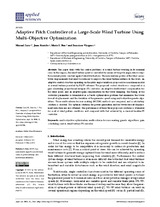Adaptive Pitch Controller of a Large-Scale Wind Turbine Using Multi-Objective Optimization
Autor
Lara, Manuel
Garrido, J.
Ruz Ruiz, Mario L.
Vázquez Serrano, Francisco J.
Editor
MDPIFecha
2021Materia
Multi-objective optimizationMulti-criteria decision making
Genetic algorithms
Gain scheduling control
Wind turbine
PI controller
METS:
Mostrar el registro METSPREMIS:
Mostrar el registro PREMISMetadatos
Mostrar el registro completo del ítemResumen
This paper deals with the control problems of a wind turbine working in its nominal zone. In this region, the wind turbine speed is controlled by means of the pitch angle, which keeps the nominal power constant against wind fluctuations. The non-uniform profile of the wind causes tower displacements that must be reduced to improve the wind turbine lifetime. In this work, an adaptive control structure operating on the pitch angle variable is proposed for a nonlinear model of a wind turbine provided by FAST software. The proposed control structure is composed of a gain scheduling proportional–integral (PI) controller, an adaptive feedforward compensation for the wind speed, and an adaptive gain compensation for the tower damping. The tuning of the controller parameters is formulated as a Pareto optimization problem that minimizes the tower fore-aft displacements and the deviation of the generator speed using multi-objective genetic algorithms. Three multi-criteria decision making (MCDM) methods are compared, and a satisfactory solution is selected. The optimal solutions for power generation and for tower fore-aft displacement reduction are also obtained. The performance of these three proposed solutions is evaluated for a set of wind pattern conditions and compared with that achieved by a classical baseline PI controller.

